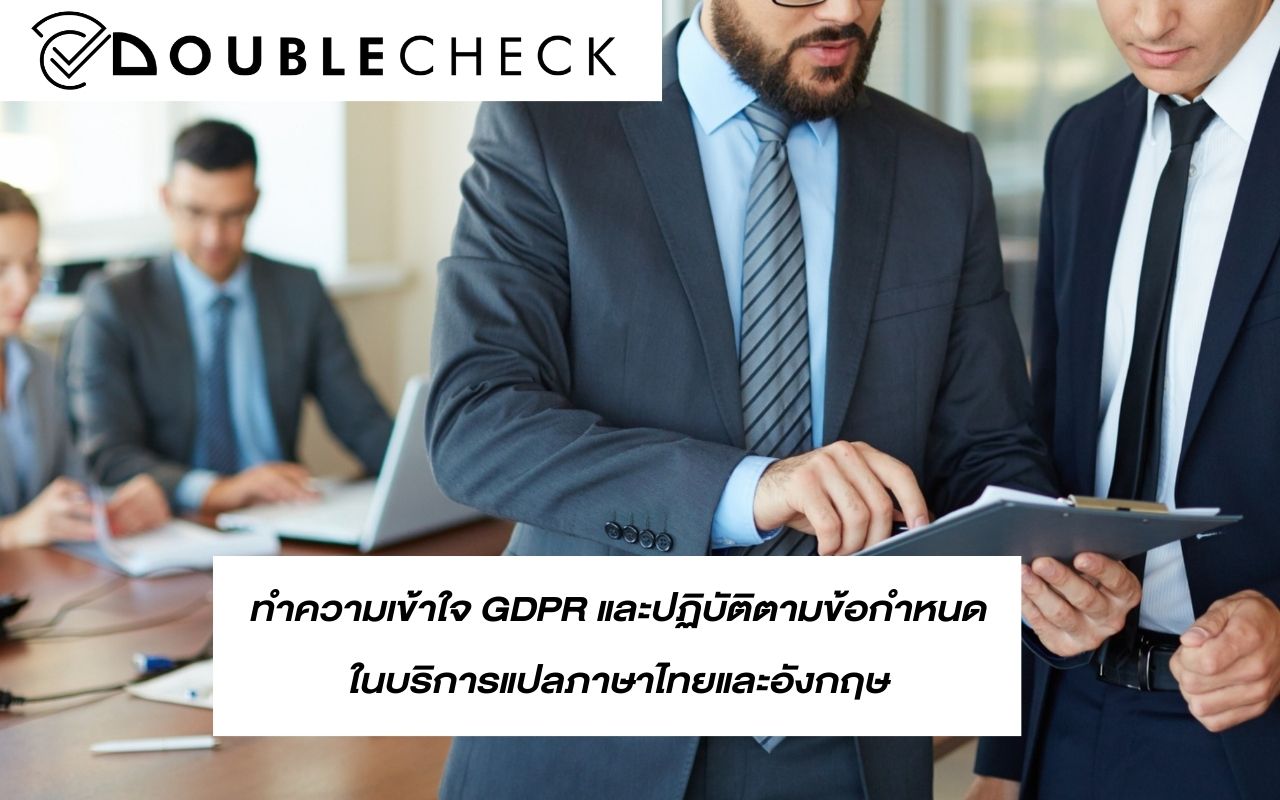In a world where data has become a valuable commodity, protecting an individual’s private information is of paramount importance. This has led to the creation of stringent data protection laws such as the General Data Protection Regulation (GDPR), a regulation in EU law that provides strict guidelines on Data Protection and privacy.
These regulations have a far-reaching impact, affecting not only businesses within the EU but also those dealing with EU citizens. This includes companies involved in the provision of translation services. In this article, we will delve into the intricacies of understanding GDPR and how to ensure compliance in Thai and English Translation Services

The General Data Protection Regulation (GDPR) was enacted in the European Union (EU) in 2016 and came into effect in 2018. The primary objective of the GDPR is to provide EU citizens with greater control over their personal data. It sets out the principles for data management and the rights of the individual, while also imposing heavy penalties for those who violate these guidelines.
GDPR mandates that businesses must ensure the confidentiality, integrity, and availability of all Personal Data they process. They must also be able to demonstrate compliance with GDPR. This includes translation services handling sensitive information during the translation process. Understanding these guidelines is the first step towards ensuring GDPR compliance.
Translation services, particularly those engaged in the delicate fields of medical, legal, or finance, often find themselves in a position where they must handle the personal data of individuals throughout the translation process. This crucial responsibility could arise from a variety of sources such as documents that require translation or even during their direct interaction with clients. Consequently, the operations of these translation services fall squarely under the legal regulations of the General Data Protection Regulation, or GDPR.
Take, for example, the task of translating a complex legal document from Thai to English. This process may unavoidably involve dealing with sensitive personal data. If the document in question pertains to an EU citizen, the Translation Service provider is compelled to adhere strictly to the guidelines set out by the GDPR.
The same rules apply to English to Thai translation services. Should they find themselves dealing with EU clients or translating documents that contain data on EU citizens, these service providers are legally mandated to comply with the GDPR regulations. The potential ramifications for non-compliance serve as a stark reminder of the importance of Data Protection in our increasingly globalized world.
Ensuring GDPR compliance in translation services involves multiple steps. Firstly, it is crucial to have a clear understanding of what constitutes personal data. This can range from a person’s name, address, email, and phone number to more sensitive data like health information, racial or ethnic data, or biometric data.
Once the data is identified, translation services must ensure they have a lawful basis for processing that data. This could be the consent of the individual, a contract, legal obligations, or more. In the field of translation, this often means obtaining the consent of the client before proceeding with the translation of documents containing personal data.
Another critical aspect of GDPR compliance is ensuring the security of the data. Translation Services must implement appropriate technical and organizational measures to safeguard personal data. This could involve encrypting the data, ensuring secure storage and transmission, and implementing robust access control mechanisms.
Moreover, translation services should also have clear guidelines in place for data breaches. They should be prepared to report any data breaches to the relevant authority within 72 hours and must inform the individuals affected if the breach poses a high risk to their rights and freedoms.
In conclusion, understanding GDPR and ensuring compliance is crucial for Thai and English Translation Services dealing with EU clients or handling Data Protection of EU citizens. While GDPR compliance might seem daunting, it is an essential aspect of protecting individual privacy rights in the digital age. By understanding the requirements of GDPR and taking steps to ensure compliance, translation services can not only avoid hefty penalties but also foster trust with their clients, thereby enhancing their reputation and credibility in the industry.
Double Check Thailand offers top-notch translation services in Thailand. With a team of expert translators, we ensure precise and culturally sensitive translations for a variety of needs, including document translation, website localization, and legal and medical translation. Our services include professional proofreading to guarantee accuracy and polished results. Committed to timely delivery and confidentiality, Double Check Thailand stands out for their comprehensive language solutions. Whether for business, legal, or personal use, their translation services are designed to bridge language gaps effectively.

DoubleCheck provides English consulting services tailored to help Thai businesses effectively communicate with their English speaking audiences. DoubleCheck is based in Bangkok, but operates throughout all of Thailand.
